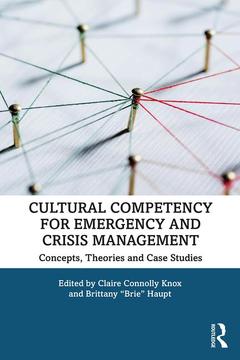Cultural Competency for Emergency and Crisis Management Concepts, Theories and Case Studies
Coordonnateurs : Knox Claire Connolly, Haupt Brittany "Brie"

Disasters are complex and dynamic events that test emergency and crisis professionals and leaders ? even the most ethical ones. Within all phases of emergency management, disasters highlight social vulnerabilities that require culturally competent practices. The lack of culturally respectable responses to diverse populations underscores the critical need for cultural competency education and training in higher education and practice. Using a case study approach that is both adaptable and practical, this textbook is an accessible and essential guide on what makes teaching effective in emergency and crisis management.
Key Features
- An in-depth understanding of cultural competence makes it well suited for teaching effectively in emergency preparedness
- Expert guidance from leading authorities ensures a fresh perspective in various aspects of emergency and crisis management
- National and international emergency and crisis management case studies containing ground rules, a scenario, roles/actors, guiding questions, facilitator questions, and resources
- Pedagogy and andragogy theories that drive design and implementation
- Pre- and post-tests for each case study allow faculty and trainers to empirically measure the participants? learning outcomes
- Short case study structure can be easily implemented in a course as a group discussion, group assignment, or individual assignment
With unparalleled resources to reach every participant and facilitator, Cultural Competency for Emergency and Crisis Management offers educators a roadmap for successfully engaging participants in various aspects of cultural competency knowledge, skills, and abilities.
1. Introduction 2. Cultural Competency Historical Presence and Development 3. Cultural Competency in Emergency and Crisis Management 4. Facilitating Difficult Conversations 5: Preparing Schools for Active Threats 6. Evacuation of an At-Risk Population: Cultural Competency and Ensuring Safety 7. Wildfires and Homelessness in the United States 8. Disaster Shelter Planning for Special Needs Populations 9. Consequence Management and HAZMAT Incidents 10. Accommodating Special Needs Populations in Disaster Management: The Case of Children with Autism Spectrum Disorder 11. Diversity During a Storm: Accommodating Religious Minorities in an Evacuation Shelter 12. Teaching Preparedness, Warning, and Protective Action with a Social Vulnerability Twist 13. Cultural Competence and Disaster Management: Flooding in Coastalville 14. Response to Ebola Virus Outbreak in a Refugee Camp: Local Contexts vs. International Standards 15. Cultural Competence Training for International Response and Recovery Workers 16. Disaster Relief in a Conflict Zone: The Case of Syria
Claire Connolly Knox, Ph.D., is an associate professor and the director of the Master of Emergency and Crisis Management program in the School of Public Administration at the University of Central Florida. Her research interests include environmental vulnerability and disaster response, environmental policy and management, Habermas Critical Theory, and the scholarship of teaching and learning. She has published in multiple journals, including Public Administration Review, Coastal Management Journal, Disaster Prevention and Management, Journal of Environmental Policy and Planning, Environmental Politics, Administration & Society, Journal of Emergency Management, and Journal of Public Affairs Education. She is chair of ASPA’s Section on Emergency and Crisis Management, associate editor for Emergency Management for Public Administration Review, and editorial board member for the International Journal of Security, Preparedness and Resilience Education, and she is the past chair for FEMA’s Scholarship of Teaching and Learning special interest group. She has won multiple awards for her research and teaching, including the 2015 Florida Emergency Preparedness Association’s Gary Arnold for her dedication to improving Florida’s emergency management community through higher education.
Brittany “Brie” Haupt, Ph.D., is an assistant professor at Virginia Commonwealth University. Her previous educational achievements contributed to developing her passion for increasing her cultural competency and becoming trained in diversity education and multiculturalism, as well as intercultural dialogue and community development. Her research interests include cultural competency, emergency management communication, community resilience, and competency-based education. She has published in Public Administration Review; Journal of Public Affairs Education; Disaster Prevention and Management; Risk, Hazards, &
Date de parution : 04-2020
15.6x23.4 cm
Date de parution : 04-2020
15.6x23.4 cm
Thèmes de Cultural Competency for Emergency and Crisis Management :
Mots-clés :
ASPA; Cultural Competency; Cultural Competence Training Program; Emergency Management; FEMA; Disaster Management; Prehospital Emergency Care; Disaster Response; Evacuation Shelters; Mitigation; Federal Emergency Management Agency; Preparedness; Wildfire Impact; Resilience; Federal Emergency Management Agency (FEMA); Public Administration; Pedagogy; Crisis Response Team; Andragogy; Emergency Management Planning; Non-profit Leadership; Arc Shelter; ASD Exhibit; Fire Science; EVD Transmission; Public Health; ASD; Homeland Security; International Aid Workers; Management; EVD Epidemic; Human Resources (HR); Green Card Holders; Teaching and Learning; Valley Cottage; crisis management; Management Academic Programs; cultural competency education; ASD Child; international emergency; Orleans Metropolitan Area; individual assignment; Anthropomorphic Climate Change; facilitator questions; ASD Participant; Hazmat Incident



